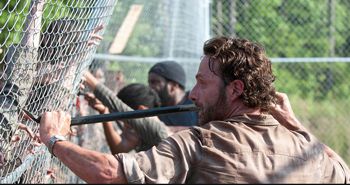 Here are a few random thoughts on The Walking Dead episode 402, “Infected“. This was the second episode of season 4 and it was a doozy.
Here are a few random thoughts on The Walking Dead episode 402, “Infected“. This was the second episode of season 4 and it was a doozy.
[Spoilers ahead.]

 Here are a few random thoughts on The Walking Dead episode 402, “Infected“. This was the second episode of season 4 and it was a doozy.
Here are a few random thoughts on The Walking Dead episode 402, “Infected“. This was the second episode of season 4 and it was a doozy.
[Spoilers ahead.]
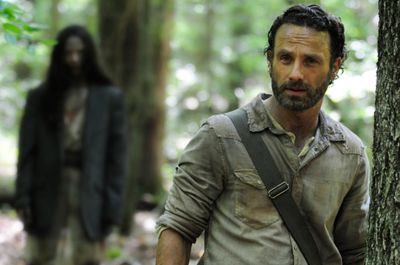 Here are a few random thoughts on The Walking Dead episode 401, “30 Days without an Accident“. This was the season 4 premiere.
Here are a few random thoughts on The Walking Dead episode 401, “30 Days without an Accident“. This was the season 4 premiere.
[Spoilers ahead.]
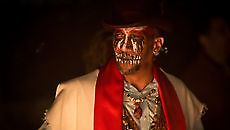 The season cliffhanger of NBC’s Grimm, spanning the last two episodes, was a fun descent into traditional Voodoo zombie lore. Reanimated corpses and Voodoo curses in a series-appropriate wrapper made for a nicely satisfying zombie distraction.
The season cliffhanger of NBC’s Grimm, spanning the last two episodes, was a fun descent into traditional Voodoo zombie lore. Reanimated corpses and Voodoo curses in a series-appropriate wrapper made for a nicely satisfying zombie distraction.
For those that don’t watch the show (which is good-not-great-but-better-than-a-lot) the premise is that we share our world with a vast menagerie of fairy-tale species called “Wesen”. Only a select few, the “Grimms”, can distinguish these creatures from normal humans. Our hero is a cop that needs to balance his sense of justice with his newly awakened talent. The show has always struggled for wide appeal but has found a dedicated audience. It just ended its second season and been safely renewed for a third.
While it generally focuses on traditional German mythology the show does, as here, take detours now and again. In this case we get a nice dose of Haitian Voodoo. Baron Samedi, or Baron Saturday, is the Voodoo spirit of the dead. He’s noted as a raucous spirit fond of drink, women and obscenity. Here he is, we discover, a “Cracher-Mortel”, a fish-like Wesen whose toxic sputum creates rampaging zombies under his control.
Of course as a season finale, this is a cliff-hanger so probably isn’t where new viewers should start watching. On the other hand, it may be the only chance you’ll ever have to see a zombie horde attack Portland, Oregon.
Horror/Drama – 2013 – Television Mini-series (Three Episodes)
The popularity of Zombies has good and bad points. To the negative, anything popular results in a deluge of copycats and wannabes and zombies have much more than their fair share of cookie-cutter movies, comics and (dare I say it?) blogs trying to cash in on the fad. The pile of dreck is mountainous and sifting through it to find the gems can be dismaying.
To the positive, once a topic becomes as mined as this one is when the really interesting stuff starts to show up. The stuff that makes you think about old ideas in a new way. An audience avid for more material means that these interesting, experimental ideas are able to get funding and support and each success makes it easier for the next.
This feature length mini-series (three hour-long episodes) explores the aftermath of a zombie outbreak. The backstory is completely traditional: the recently dead crawled out of their graves by the thousands and nearly destroyed humanity as we know it. Only through the valiant efforts of the paramilitary HVF (Human Volunteer Force) was the tide turned allowing researchers enough time to create a cure (of sorts) for the disease.
Now considered sufferers of Partially Deceased Syndrome (PDS) the former zombies require daily injections to prevent a return to their “rabid” state. They’ve spent months in therapy before the government attempts to reintegrate them back into a society that still fears and hates them. Walls and bridges are splashed with “Beware of Rotters!” and the HVF still patrols regularly. Contacts and makeup can hide the outward signs but their inability to eat normal food or heal wounds means that they can never really truly fit in.
We focus on Kieren Walker who returns home to parents insistent on acting like nothing has happened and a younger sister who spent the past few years hunting people like him. The local vicar preaches that the arisen dead are Satan’s tools and unredeemable. The government reintegration programs are ineffective, overwhelmed and resented by the locals that would rather see the rotters put down.
Within this framework the narrative treads heavily on the obvious themes of ostracism, guilt and acceptance; both on personal and a societal levels. There are also intriguing subplots of how “community” is defined in the face of such a definitional crisis, multiple levels of loyalty and the responsibility of those who can remember doing evil but were unable to stop. Throughout the entire affair is woven a continuing thread of redemption and unusual second chances.
The presentation suffers, just a little, from a lack of focus. By squeezing so much into the story they’re forced to cut some threads short. To their credit any one of these is deep enough to support another mini-series. I would love to see more about the “natural” zombie commune hinted at, the issues with physical relationships and the somewhat dead or an extension of the religious issues touched on. The world they’ve constructed is so rich that I deeply hope that we see more of it.
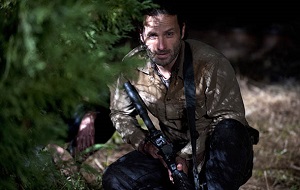 Here are a few random thoughts on The Walking Dead episode 316, “Welcome to the Tombs“. This was the season 3 finale.
Here are a few random thoughts on The Walking Dead episode 316, “Welcome to the Tombs“. This was the season 3 finale.
[Spoilers ahead.]
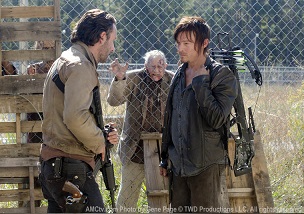
Here are a few random thoughts on The Walking Dead episode 315, “This Sorrowful Life“.
[Spoilers ahead.]
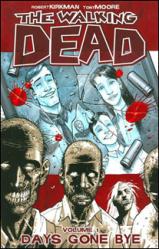 The Walking Dead is a great show – one of the best currently on television – and most people know that it was originally a comic but few people actually jump mediums and start reading the comics. Brian Huntington, over at thewalkingdead.com, has written an excellent introduction for those interested in giving the books a try but not wanting to spoil the show: “Jumping from the Show into the Comics“.
The Walking Dead is a great show – one of the best currently on television – and most people know that it was originally a comic but few people actually jump mediums and start reading the comics. Brian Huntington, over at thewalkingdead.com, has written an excellent introduction for those interested in giving the books a try but not wanting to spoil the show: “Jumping from the Show into the Comics“.
He covers which volumes are “safe” to read because the show has already passed that point in the narrative. It’s an excellent introduction, straight from the source, but I’d like to give some of my thoughts on the matter as well as I think he may have inadvertently given the wrong impression.
The simple truth is that the comics and show really don’t share as much as he intimates. The comic, now well over 100 issues and 10 years in, has created a rich menu of iconic imagery and events that the show picks liberally from but doesn’t mimic. Lifted plot points are presented in a different order, affect different characters and often have drastically different outcomes. The story remains grossly similar and is familiar to comic readers but is often radically different in execution.
To illustrate this consider that many of the characters fundamental to the show: Daryl, Merle and T-dog don’t exist in the comic at all. Others exist only in the comic or had greatly expanded (or reduced) roles there. Many of the iconic scenes shared by the two featured different cast members or circumstances. Herschel, for example, never lost his leg in the comic (although somebody else did). Finally there are major differences with character longevity between the two. Many characters that we’ve lost on the show are still struggling in the comic and vice versa.
Some of this is purely practical. When you kill off a character in a comic book you simply draw a new character. On a television show you must consider actors, casting and contracts. Should you want to make your main character an amputee you just don’t draw as much. On television there’s complex planning and effects that must go into such a decision. On paper a herd of thousands of zombies is nothing more than a literary motivation, on film it’s a massive undertaking with dozens if not hundreds of extras.
In other respects it feels like many of the decisions were made specifically to keep the story fresh for existing fans. The show has made every effort to drag the comic fans out of their comfort zones. Major events will begin to play out, or be staged, exactly as they were in the comics but then take shocking turns away from the original path and other events, some hugely significant, are completely new to the show. At the risk of a spoiler I will simply say that nobody was as shocked to see Sophia come out of that barn as long term fans of the comics. It was a gut-punch, pure and simple.
The television production has done everything it can to retain the flavor – the “values”, if you will – of the comic while making it a completely new experience. Having read the comics simply doesn’t spoil the show because the show is so very different. The only real insight that you’ll gain from enjoying both is the unsettling realization that nobody is safe. Nobody at all. It may also make you insufferable as you constantly explain to your family and friends how different things were in the book and how they really should start reading it.